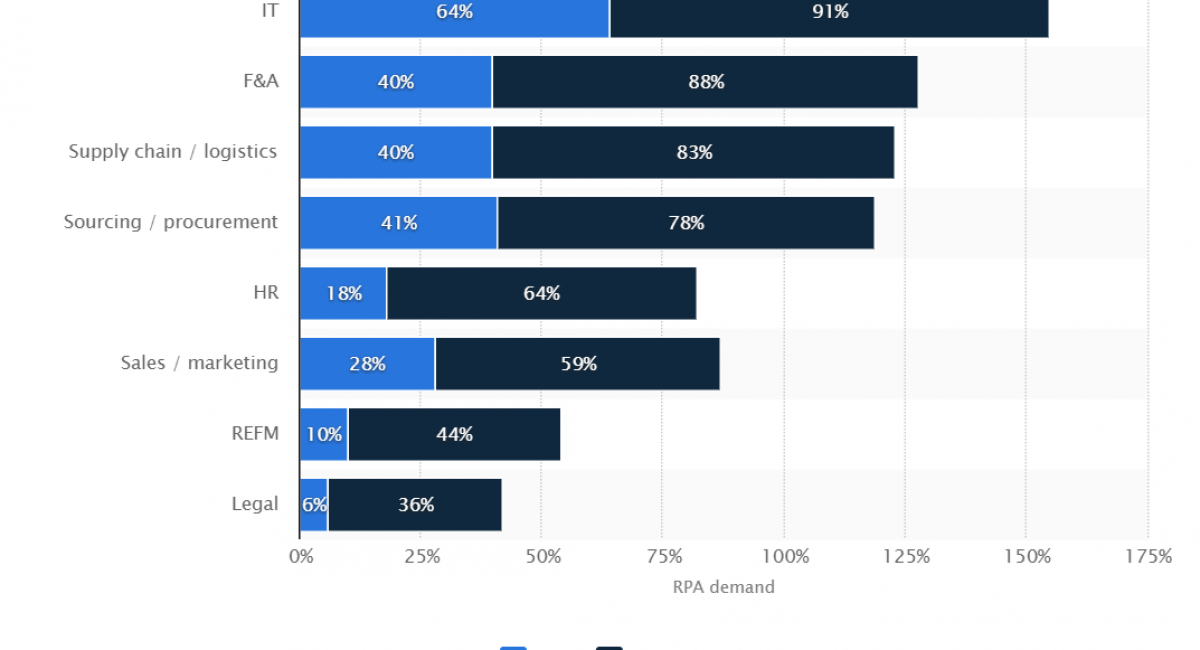Changing technology to RPA
This article focuses on how you can change your technology and domain completely to RPA and make a career out of it.

By Admin
Changing from one technology to another or from one domain to another is a a necessity in today’s work environment.If you have very less experience in IT like 1-5 years, this is relatively easy as normally companies don’t expect you to be an expert in anything and give opportunities to learn while working on the job.But if you are experienced enough, you have to deliver on the job from day 1 without any excuse, because you are being that much. We will discuss how changing technology to RPA will help you get a high salary and put you in a domain of high demand technology.
There are 2 ways you can switch career to robotic process automation.
1. Change technology inside you organization:
This is the easiest way to change your career and requires less effort.Your company also trains you on RPA tools and you can gradually move your career to RPA completely after wokring around 6 months or in 1 project.If your company doesn’t provide RPA training you can enroll in rpa online course or in a coaching institute.
2. Switch to a company which have a lot of RPA projects:
This is a move which completely changes your career ,but you have to put significant effort on it .You need to study for around 3-6 months at home and do some dummy projects.In your resume, you can show the same projects and domains as RPA projects.So basically you can project your relevant experience to some level and perform well in interview.However you need to enroll yourself in a RPA course and learn from the best.
Is RPA a good career move ?
There is a great potential with RPA . I can tell you that because I use Blue Prism. The way top-tier companies such as Google and Aviva embrace this as a way to drive change. This implies 75% of the business processes will be automated in the near future and many developers would probably transition to automation developers to keep up with the evolving technology.
From my observation, most RPA tools are based on .Net Framework because they are more stable, so learning .Net framework is a good tool for your future. Mind you there are always going to be opportunities in the job market for .Net developers, I’m not implying that Java or other tools are not good tools. Learning the MVC architecture comes in handy for other languages as Angular js but you should be aware of the usefulness of such architecture . Coming back to Blue Prism, a lot of people in the industry get the impression that all relevant programming skills( C#, VB.NET etc) acquired during your journey as a software developer becomes a waste when you go into automation but boom that’s a lie !!! The software provides a programming suite called a code stage that enables programmers with experience in .Net( C#, VB and J#) to write programs to extend the basic functions the software provides. So you need to interface your process with powershell, write a vb script or C# code to do – simple as it sounds that’s the way I look at it. With RPA, you get to keep your C#, VB skills and more so work with an RPA company in future.
So I suggest you think thoroughly about this.
Learn RPA Today
“RPA will create more jobs than it will erase.If you are thinking about a career move which requires less coding and better pay, you should definitely go and try this out.
Robotic process automation in practice
Health care provider Ascension Health deployed an RPA system from Blue Prism in early 2014 when it needed a way to avoid time-consuming manual processes associated with its move to a new ERP platform.
“There is work that we refer to as ‘swivel chair’ activities, where we transfer data from one source into the ERP or one of the support systems,” says A.J. Hanna, senior director of operations support at Ascension. “Despite the implementation of the standard ERP, there is still a large volume of local policy variability that has to be addressed.”
The use of RPA didn’t result in the elimination of jobs at the company, but the possibility “certainly exists” in the future, Hanna says. “The impact to frontline processing staff is the greatest potential change to our workforce,” he says. “A large part of our focus is trying to find ways to be able to absorb the additional workload that we know is coming” without having to add staff.
Another company CGI has seen reduced efforts across a range of activities, from simple password resets to more complex logic-based activities such as payroll and help-desk problem resolution. Like Ascension Health, the firm at this stage hasn’t seen RPA affect the makeup of the IT workforce. “But it may well be something we need to think about in the future,” Wootton says.

Hype vs Reality
Experts say RPA doesn’t represent all gloom for tech workers. For one, the technology itself will provide opportunities because organizations will need people who are skilled in implementing, managing, and maintaining the programs.
“There is going to be a need for new skill sets in lower and middle management, for people who are able to work with RPA platforms and understand how to manage them,” IRPA’s Casale says. He has talked with people who worked in IT support and were displaced by RPA systems who received training and went on to become experts in process automation.
In addition, companies could move some of the displaced workers into more interesting and challenging types of jobs — either in IT or other areas of the business.
“Absolutely will [RPA] free up time to do more important and more demanding jobs in IT,” Arago’s Boos says. “The demand for experienced IT people is so incredibly high and cannot be fulfilled by the current supply from universities and other education programs. Especially on the experience side, moving people up the value chain is most important, and RPA will be a major enabling factor here.”
Ascension Health has been able to free up some workers to focus on more complex activities, Hanna says. The company’s goal is to cross-train or up-skill as many operations workers as might be displaced by the use of RPA, Hanna says. “In some ways, we see the use of RPA as having a greater potential to retain levels of staffing that you might not have if you outsourced the entirety of the work to a traditional BPO,” he says.
Because there will always be exceptions that “fall out of the parameters covered by the robot, an organization might keep the staff where previously they would have been outsourced,” Hanna says.
CGI has been able to shift some of its IT people to other business activities, Wootton says. “We see RPA changing the type of activities our people work on, by automating many of the repetitive tasks, freeing up time for more value add activities [and] ultimately providing our people more interesting and involving roles,” he says.
